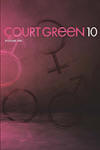Court Green – 2013
Court Green devotes a big chunk of every issue to a dossier on a special topic or theme. This year it’s sex. There are many fine poems here, but before I get to them, I want to make an observation based on reading so many poems about sex in one bunch.
Court Green devotes a big chunk of every issue to a dossier on a special topic or theme. This year it’s sex. There are many fine poems here, but before I get to them, I want to make an observation based on reading so many poems about sex in one bunch.
Writing about sex with the intention of recreating the experience poses an unusual challenge. Unlike writing about food, travel, art, music, and cinema, writing about sex is difficult to make anywhere near as good as the real thing. Catalogs, bragging, and lists of shocking activity get boring, and efforts to mimic the craziness of sex through crazy language are tough to decipher.
That said, many sex-centered poems in this issue show us how it can and should be done. Denise Duhamel, for example, has three fine poems laced with anger, comedy, confusion, and sadness. In “You Don’t Get to Tell Me What to Do Ever Again,” the narrator finds that while sex is always—literally and figuratively—at hand, what we want and need from it can be maddeningly elusive. Freed from a marriage-gone stale, she finds herself
jerking off
as the hands of my imagined and real lovers,
dead or gone, reach down from the ceiling
sprinkling me with rose petals . . .
. . . . . . . . . . . . . . . . . . . . . . . . . . . .
and I pretend I can do whatever I want.
A focus on desire rather than the act itself is often an effective strategy for the best among these poems. Albert Goldbarth uses it in a long, six-part riff entitled “A Partial List of Unacknowledged Sex.” He begins by comparing pollen in the air to chaperoning a party of fifteen-year-olds where no one can acknowledge the “static sex electricity” in the room, “so thick that a single errant loosed spark / from a carpet or petting the cat will make / the entire room into a bomb.”
Humor is a great strategy. In “Sex Education,” Ron Koertge shows us adolescent boys watching dogs “doing it.” They think it’s hilarious until “Mrs. Berryman came out in her slip,” wearing a smirk “like none of our mothers.” After a flip of her cigarette and a wink, “. . . tag or Red Rover seemed / stupid. It had to be football so we / could handle each other and bleed.”
And then there’s the dark side. Most Americans have come around to the idea that rape isn’t about sex, it’s about violence and power, for which sex is merely a means. Emma Bolden takes us into the center of that experience with her stunning, “Somewhere She’s Holding in Silence,” a tour de force and one of the strongest poems in the issue.
In the contributors notes, writers were asked to identify the most unusual place they have had sex. As one would expect, there are plenty of stairwells, vehicles, elevators, landscapes, and witty answers like “Indiana.” Bolden, in addition to writing a superb poem, supplied the best answer: “Chex? Where’s the most unusual place I’ve had Chex? Probably in the hallway of my dorm whilst walking to the laundry room.”
The non-dossier half of the issue includes memorable work by Mary Ruefle, Kathleen Ossip, Maureen Seaton, Eric Burger, Matthew Thorburn, Terence Winch, Robert Hershon, and many others. There’s also a selection of spare, anti-poetic poems by the late Ed Smith, edited by Bruce Hainley.
The dossier theme for next year is creative response, in poetry, short lyric essay, or non-academic prose, to the life, work, and legacy of the late James Schuyler. Get those pencils sharpened. Judging by this issue, the competition is likely to be fierce.
[www.colum.edu/courtgreen]





